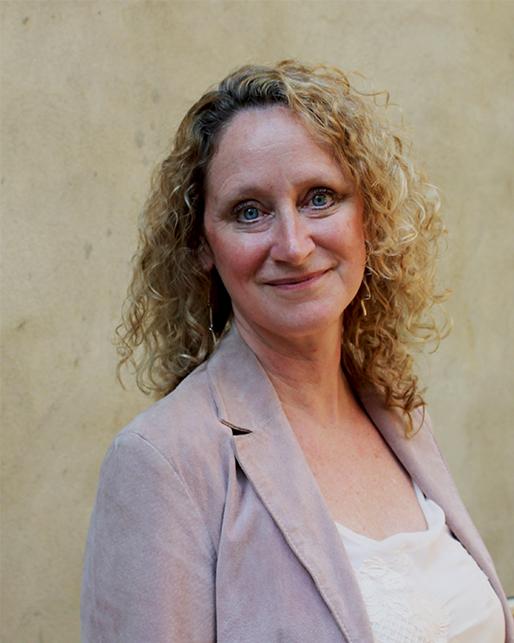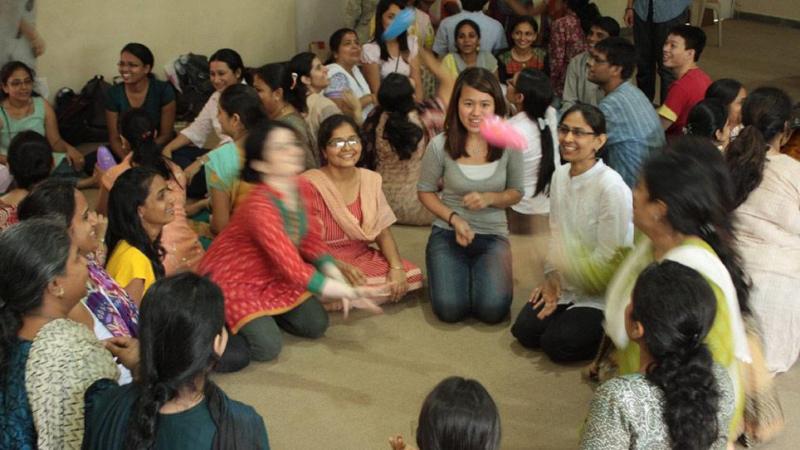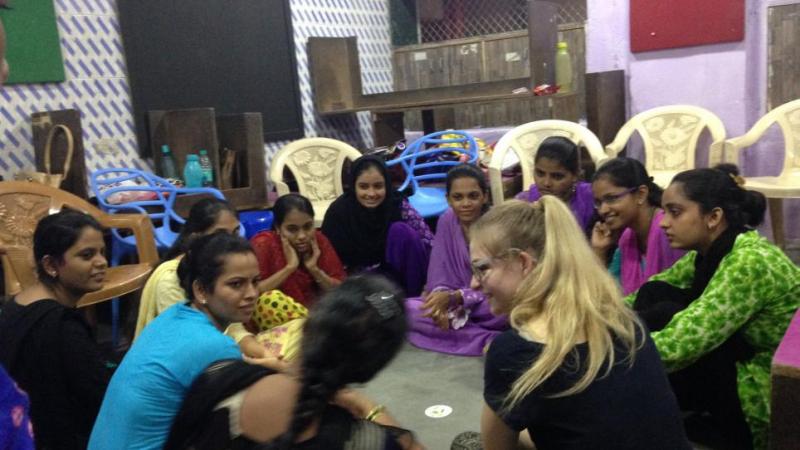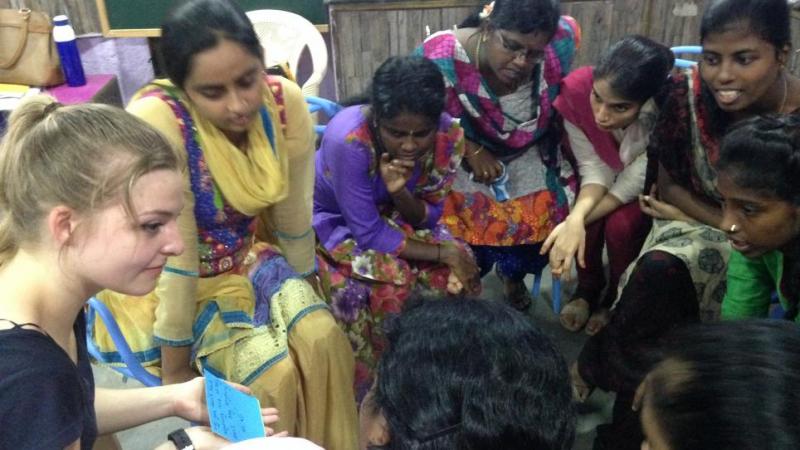BWW Blog: Royal Central School of Speech and Drama's Dr. Selina Busby on Applied Theatre
 Dr Selina Busby is a Principal Lecturer in Community Performance and Applied Theatre, and Course Leader for the MA Applied Theatre at London's Royal Central School of Speech and Drama. She is an applied theatre practitioner who works in prison settings, youth theatres, and with young people living in adverse conditions, both in the UK and internationally.
Dr Selina Busby is a Principal Lecturer in Community Performance and Applied Theatre, and Course Leader for the MA Applied Theatre at London's Royal Central School of Speech and Drama. She is an applied theatre practitioner who works in prison settings, youth theatres, and with young people living in adverse conditions, both in the UK and internationally.
Applied theatre at Central is highly regarded internationally as a world leader with the largest number of specialist teaching staff in the field.
The MA Applied Theatre encourages investigation into the possibilities and contradictions of drama and theatre practice as transformative and rehabilitative, and it engages practically and critically with a range of theories and current practices. The Postgraduate Certificate in Applied Theatre with Young People is run in association with the National Theatre, as part of their Connections Scheme, and provides a qualification based on work undertaken in partnership with The National Theatre in directing theatre and drama with young people under the age of 25 years.
In this article, Dr Busby discusses her work with Central's Applied Theatre students who make theatre in community and education settings around the world. These projects - and more - will be discussed in more detail in Dr Busby's forthcoming book Applied Theatre: A Pedagogy of Utopia which will be published by Bloomsbury Methuen in November 2020.
 At the start of this new decade, I am a little startled to realise that I have been making theatre in community and education settings for over twenty-three years often with groups of students co-facilitating the work so that in effect the work has layers of learning for all participants; it's part of my work-ethic, something I have come to hold dear and realise forms a backbone of the practice.
At the start of this new decade, I am a little startled to realise that I have been making theatre in community and education settings for over twenty-three years often with groups of students co-facilitating the work so that in effect the work has layers of learning for all participants; it's part of my work-ethic, something I have come to hold dear and realise forms a backbone of the practice.
During this time I have made plays with ordinary people from many different age ranges and in some unusual places. I have had the privilege of making theatre with elders with dementia, with men living in prisons in the UK and Malta, in a rain forest with indigenous communities in Costa Rica, with youth theatres in London, in a shelter for homeless youth in New York, with teachers and children on the streets and in schools in India, in pupil referral units in the home counties, with those living with domestic violence, and students in Chile, China, Korea the US, The Czech Republic, Slovakia and the United Kingdom. For the last fifteen of these twenty-three years, I have been the course leader of the MA Applied Theatre at The Royal Central School of Speech and Drama in London, where I train students to make theatre in many unusual places; unglamorous spaces with no stage lights, with no red carpets; schools, hospitals, and prisons. Together with local people we improvise theatre with communities of who might not have imagined that they could write and perform for audiences.
For those of you to whom the term Applied Theatre is new, it is a theatre practice that invites individuals, communities, institutions and governments to re-think, re-consider and re-imagine their futures and maybe to change. That's quite a difficult concept to grasp so I am going to talk about three examples of projects that I and my students have worked on where I think that there is evidence that change has taken place: these are - The Children's Play Project; The Dharavi Project in India and Crossing Bridges in the US. The students who work with me on these projects are all undertaking placements or internships on these projects and they are assessed for part of their BA or MA course
 Making Children's Theatre with adult inmates is not an obvious choice for prison theatre and yet this project has run in many prisons in the UK and in one prison in Malta. Working with about twenty offenders who are fathers, we collaborate to make a piece of theatre for five to eight-year olds over a two-week period. At the end of the project the father's children and families are invited into the prison to see their dads perform. This allows the incarcerated men to access the arts, not just by seeing theatre but by making it when they have little outlet for creativity. While devising and rehearsing the play, the men can re-position themselves as more then prisoners - as artists. This process invites them to see that they can be successful and productive and to believe that change is possible. It develops their confidence and enhances their relationships with their children and helps to keep their families together - and statistically it has been proven in the UK that maintaining family relationships helps to reduce reoffending rates.
Making Children's Theatre with adult inmates is not an obvious choice for prison theatre and yet this project has run in many prisons in the UK and in one prison in Malta. Working with about twenty offenders who are fathers, we collaborate to make a piece of theatre for five to eight-year olds over a two-week period. At the end of the project the father's children and families are invited into the prison to see their dads perform. This allows the incarcerated men to access the arts, not just by seeing theatre but by making it when they have little outlet for creativity. While devising and rehearsing the play, the men can re-position themselves as more then prisoners - as artists. This process invites them to see that they can be successful and productive and to believe that change is possible. It develops their confidence and enhances their relationships with their children and helps to keep their families together - and statistically it has been proven in the UK that maintaining family relationships helps to reduce reoffending rates.
The Dhavari project has taken place in Mumbai, India for the last thirteen years making theatre with young slum dwellers. In this project we focus on making theatre that allows the young people to talk to their families and communities about things that are important to them; about the things that it is hard to start conversations about. The young people make theatre about sexual equality, sexual violence, same sex relationships, sanitation, health and domestic violence. These performances amplify the young people's voices, develop confidence and may lead to change for participants and the audiences who witness the work.
The Crossing Bridges project took place for three years in the USA working in partnership with Covenant House in their shelter for homeless youth in New York. It brought together young shelter dwelling youth and a range of Broadway professionals in a skills exchange - with the professionals sharing workshops on acting, directing, choreography, singing, puppetry and playwriting. Together the youth and professionals devised urban fairy tales infused with rap and street dance over a twenty-four-hour period and then performed them to an audience at an off- Broadway theatre. The young people leave the project with sounds of applause ringing in their ears, having learnt transferable skills such as teamwork, communication, problem solving, and feeling like they have achieved a moment of success.
Applied Theatre makes theatre with those whose voices aren't usually heard; they  tell the stories we don't hear in theatres, movies or in cultural venues. They are stories that need to be told and, in the telling, the ordinary people who create and perform them change and see new versions of themselves. I in turn learn just how amazing my students are and how valuable making theatre can be and how extraordinary, resilient, funny, talented and creative those 'ordinary' people are.
tell the stories we don't hear in theatres, movies or in cultural venues. They are stories that need to be told and, in the telling, the ordinary people who create and perform them change and see new versions of themselves. I in turn learn just how amazing my students are and how valuable making theatre can be and how extraordinary, resilient, funny, talented and creative those 'ordinary' people are.
The Royal Central School of Speech and Drama is a leading UK drama school located in London - a highly regarded, specialist conservatoire and a constituent college of the prestigious University of London. Central provides specialist training in the dramatic and performing arts, offering Bachelor's and Master's degrees as well as short courses and PhD opportunities. Students from across the world study on Central courses, bringing a rich diversity of skills and experience to create a unique community and training environment.
All of Central's courses take place on the school's Swiss Cottage campus in Hampstead, a quiet, leafy corner of London which is only 10 minutes by tube from the bright lights of central London's West End theatre district. Central's campus houses the 234 seat Embassy Theatre, numerous workshops, rehearsal, movement and performance studios and the new £16.7 million state of the art North Block building comprising a studio dedicated to film, media and digital work and a galleried, courtyard theatre.
Central holds auditions and interviews for its courses across the globe, including New York City (8 and 9 February 2020) and San Francisco (4 and 5 February 2020). To find out more and to register your interest in being considered for a course, please visit the Central website here.
Videos


